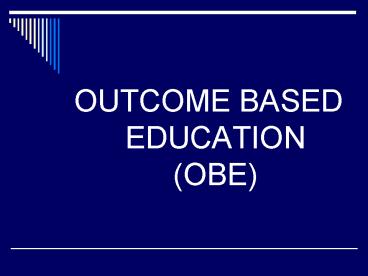OUTCOME BASED EDUCATION OBE - PowerPoint PPT Presentation
1 / 18
Title:
OUTCOME BASED EDUCATION OBE
Description:
Directed/focussed at achieving certain specified ... Outcomes - key capabilities and qualities that should be developed/acquired by ... ( ABET Criteria, 2004) ... – PowerPoint PPT presentation
Number of Views:11618
Avg rating:3.0/5.0
Title: OUTCOME BASED EDUCATION OBE
1
- OUTCOME BASED EDUCATION (OBE)
2
Important Points On OBE
- OBE is an educational process.
- Directed/focussed at achieving certain specified
outcomes in terms of individual student learning. - Outcomes - key capabilities and qualities that
should be developed/acquired by students at the
end of their study. - Both structures and curricula are designed to
achieve those capabilities or qualities. - Educational structures and curriculum are
regarded as means. They should be evaluated for
Continuous Quality Improvement (CQI)
Extracted from PM Dr. Titiek Khawas slides on
OBE presented at FTMSK on 22 June 2007
3
Outcome Based Education (OBE)
- An educational process which is based on
trying to achieve certain specified outcomes in
terms of individual student learning. Thus,
having decided what are the key things students
should understand and be able to do or the
qualities they should develop, both structures
and curricula are designed to achieve those
capabilities or qualities. Educational structures
and curriculum are regarded as means not ends. If
they do not do the job they are rethought.
Extracted from PM Dr. Titiek Khawas slides on
OBE presented at FTMSK on 22 June 2007
4
Definition of OBE
OBE is a process that involves the restructuring
of curriculum, assessment and reporting practices
in education to reflect the achievement of high
order learning and mastery rather than
accumulation of course credits.
Extracted from PM Dr. Titiek Khawas slides on
OBE presented at FTMSK on 22 June 2007
5
Current Scenario
- Current curriculum
- Prescribed, essentially rigid structure
- Specified content and proportions
- Little scope for flexibility
- The Curriculum was not designed to prepare
students and graduates towards achieving the
objectives of the programme. - Students were not informed on the objectives and
outcomes of the programme and what are expected
from them in order to achieve the outcomes
Extracted from PM Dr. Titiek Khawas slides on
OBE presented at FTMSK on 22 June 2007
6
Curriculum - requires Restructuring/Revision
Delivery method becomes more innovative/Flexible
Amongst expected changes
Assessment Evaluation Methods more varieties
All claims must be based on evidences
Continuous Quality Improvement is emphasized
Extracted from PM Dr. Titiek Khawas slides on
OBE presented at FTMSK on 22 June 2007
7
Requirement of OBE
- Each program must formulate program outcomes that
foster attainment of the program objectives. - There must be processes to produce these outcomes
and an assessment process, with documented
results, that demonstrates that these program
outcomes are being measured and indicates the
degree to which the outcomes are achieved. - There must be evidence that the results of this
assessment process are applied to the further
development of the program.
Extracted from PM Dr. Titiek Khawas slides on
OBE presented at FTMSK on 22 June 2007
8
Approach in implementing OBE
- Modify existing curricular (rather than start
from scratch) - Revise Course Content Structure
- Introduce Innovative Delivery Methods
- Introduce Innovative Assessment Evaluation
Tools - Introduce System of Data Evidence Collection
- Continuous Quality Improvement
Extracted from PM Dr. Titiek Khawas slides on
OBE presented at FTMSK on 22 June 2007
9
Definition
- PROGRAM OBJECTIVES Broad statements that
describe the career and professional
accomplishments that the program is preparing
graduates to achieve. (ABET Criteria, 2004) - Broad goals that addresses institutional
and program mission statements and are responsive
to the expressed interests of various group of
stakeholders. (Felder and Brent, 2003) - PROGRAM OUTCOMES Statements that describe what
students are expected to know and be able to do
by the time of graduation. These relate to the
skills, knowledge, and behaviors that student
acquire in their matriculation through the
program.
Extracted from PM Dr. Titiek Khawas slides on
OBE presented at FTMSK on 22 June 2007
10
Definition
- ASSESSMENT Processes that identify, collect,
use and prepare data for evaluation of
achievement of program outcomes or educational
objectives. - EVALUATION Processes for interpretation of data
and evidence from assessment practices that
determine the program outcomes are achieved or
result in actions to improve program.
Extracted from PM Dr. Titiek Khawas slides on
OBE presented at FTMSK on 22 June 2007
11
A Model Hierarchy
Vision Mission of the Institution/Faculty
Programme Outcomes or Competencies
Course Objectives or Course Outcomes
Extracted from PM Dr. Titiek Khawas slides on
OBE presented at FTMSK on 22 June 2007
12
Programme Objectives (PEO)
Programme Outcomes (PO)
Course Outcomes of Course 1
Course Outcomes of Course 2
Course Outcomes of Course 3
Course Outcomes of Course etc.
Extracted from PM Dr. Titiek Khawas slides on
OBE presented at FTMSK on 22 June 2007
13
LEARNING OUTCOMES
- specify what learners NEW BEHAVIOURS will be
after a learning experience - state the knowledge, skills and attitudes
students will gain - begin with an action verb which is measurable.
14
LEARNING OUTCOMES MUST BE
- Understandable
- Measurable
- Achievable
- Participant-oriented
15
DOMAINS OF LEARNING OUTCOMES
- 1. COGNITIVE - thinking, knowledge.
- 2. PSYCHOMOTOR - doing, skills.
- 3. AFFECTIVE - feeling, attitude.
16
What we need to do?
- Understand the vision of the faculty
- Vision of the FTMSK
- To be a centre of excellence in academic and
research in the field of information technology
and quantitative sciences. - Menjadi pusat kecemerlangan pendidikan dan
penyelidikan dalam bidang teknologi maklumat dan
sains kuantitatif
17
What we need to do?
- Understand the mission of the FTMSK
- Memenuhi misi UiTM dengan mengukuh dan
mempertingkat dan mewujudkan kegiatan
pembelajaran, pengajaran dan penyelidikan dalam
bidang teknologi maklumat dan sains kuantitatif
sesuai dengan keperluan negara
18
OBE































